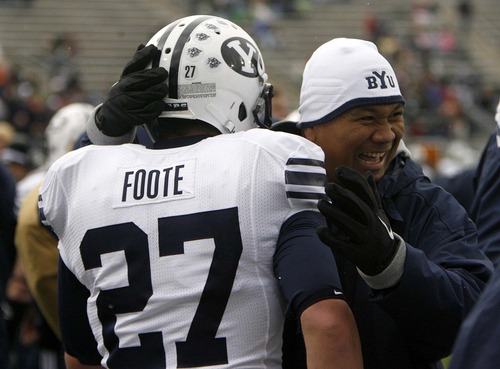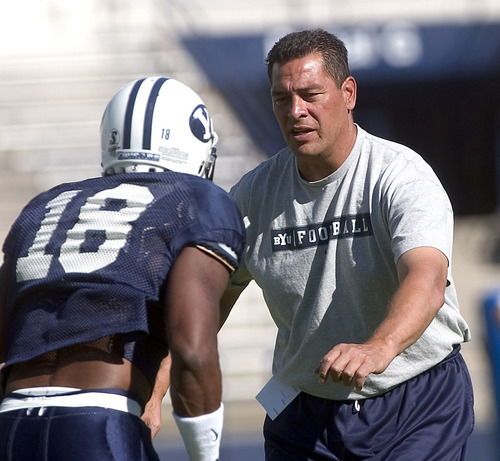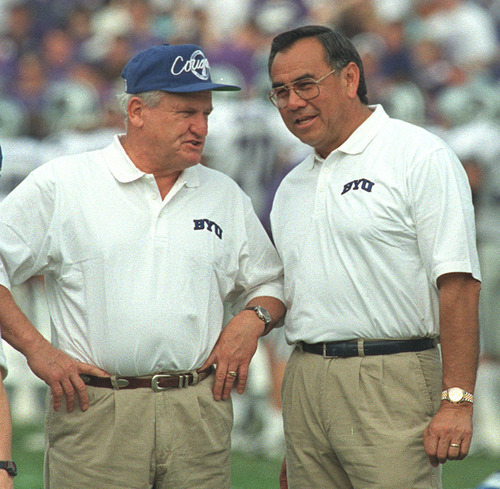This is an archived article that was published on sltrib.com in 2013, and information in the article may be outdated. It is provided only for personal research purposes and may not be reprinted.
Like most examples of football strategy, BYU's recruitment of Polynesian players stemmed from an opponent's success against the Cougars.
In the early 1970s, Arizona State's highly ranked teams featured Junior Ah You, a Hawaiian defensive lineman who terrorized BYU's quarterbacks in the Western Athletic Conference. Ah You's impact resonated with BYU coach LaVell Edwards and eventually would change the look of the BYU program via the influence of Polynesian players, mostly members of The Church of Jesus Christ of Latter-day Saints.
BYU's 1984 national championship team featured several Polynesian stars, including linebacker Kurt Gouveia, offensive lineman Robert Anae, running back Lakei Heimuli, return specialist Vai Sikahema and receiver Glen Kozlowski, born to a Samoan mother.
Much as Ah You had influenced Edwards' thinking, BYU's success brought increased attention to recruiting in Hawaii. BYU's coaches once "could go over there and pick out whoever they wanted," Sikahema said. "Over time, the other schools got smart."
Utah was one of them when Ron McBride became the Utes' coach in 1990. In those days, only Nebraska and a few Pac-12 schools, including Arizona with former Hawaii coach Dick Tomey, had much recruiting presence in the islands. Most Pac-12 coaching staffs now include at least one recruiter with a Polynesian background and, with the cultural population shifting, Polynesian players are being discovered almost everywhere.
Polynesian athletes played a major role in Utah State's recent turnaround, with former coach Gary Andersen having made clear from the start that recruiting them would be a tenet of his program — after having worked for McBride at Utah.
"It really made kids take notice when he said he wanted to bring them in," said Frank Maile, who remains USU's defensive line coach.
Having followed the program closely, Sikahema is discouraged that BYU no longer dominates Polynesian recruiting, citing Notre Dame linebacker Manti Te'o, Utah defensive lineman Star Lotulelei and UCLA offensive lineman Xavier Su'a-Filo. He's hopeful that will change with the recent hirings of Anae and former BYU running back Mark Atuaia as Cougar assistant coaches.
In Hawaii, the recruiting work of BYU, Utah and other programs obviously has affected the state's flagship school. The University of Hawaii produced an unbeaten regular season in 2007 and played in the Sugar Bowl, but its recent struggles reflect the greater competition for homegrown players.
Hawaii native Norm Chow, BYU's primary recruiter in the islands in the 1980s and '90s, intends to reverse that trend. Acknowledging that his new job as Hawaii's coach made him "change my recruiting pitch," Chow is using the theme of "stay home and make us proud."
Chow's emphasis is for UH to do a better job of discovering and evaluating local talent. He points to Gouveia, who enjoyed a long NFL career, as having "nowhere else to go" except BYU. During his recent time at UCLA, Chow said he found recruiting in Hawaii "almost too easy" because UH overlooked players.
Chow himself left home to play for Utah in the mid-1960s. Famika Anae, Robert's father, was BYU's first Hawaiian recruit in the '50s, and John Kapele became the first Polynesian to go from BYU to the NFL, playing for Detroit from 1960-62.
Junior Ah You's younger brother, Charlie, became a BYU running back in the '70s and Junior's sons, Kingsley and Harland, later played for the Cougars as the Polynesian influence took hold in Provo. Even when Hawaii was competing successfully against BYU in the WAC, the recruits kept coming. Hawaii beat BYU 59-28 in 1990, but Atuaia and future NFL tight end Itula Mili still signed with the Cougars two months later.
Bob Wagner, then Hawaii's coach, lamented, "It is a rite of passage that you have to go away."
And after Junior Ah You did so, college football changed forever at BYU and beyond.







